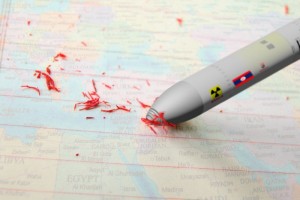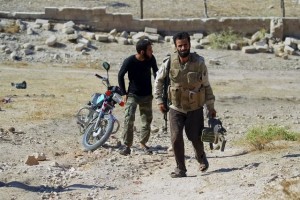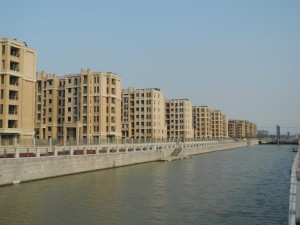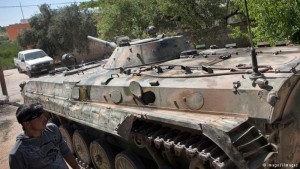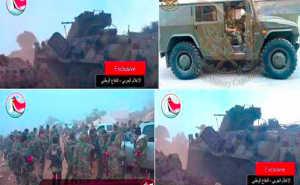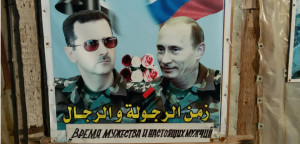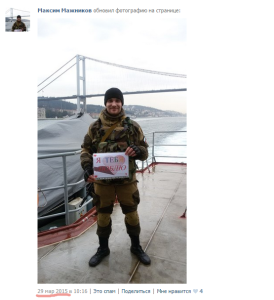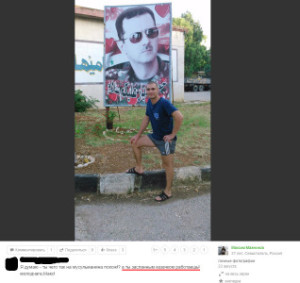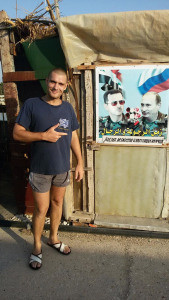Ministro de Asuntos Exteriores de Arabia Saudí: “El DÁESH Para el Islam es como el Ku Klux Klan para los cristianos de América”
Biografía: Adel al-Jubeir
- Adel al-Jubeir es Ministro de Asuntos Exteriores de Arabia Saudí desde el año 2015
- Es el primer Ministro de Asuntos Exteriores que no pertenece a la familia real de Arabia Saudí
- Estudió en diferentes países y habla correctamente árabe, inglés y alemán.
- En 2011 sobrevivió a un intento de asesinato
La atrocidad en la guerra de Siria, la inestable situación en Turquía, el Yemen también en guerra… Oriente Medio está en un momento complicado. Para hablar acerca de lo que está ocurriendo en la región, estamos con el Ministro de Asuntos Exteriores de Arabia Saudí, Adel al-Jubeir.
Olaf Bruns, periodista de Euronews pregunta:
“Ministro, durante décadas la política exterior saudí se trató con mucha cautela. Ahora vemos que están llevando a cabo una postura mucho más valiente. Están interviniendo en el Yemen, tienen una posición clara con respecto a Irán, en Siria luchan contra el grupo Estado Islámico, Al Qaeda y el Presidente Bachar al-Assad. ¿Hay que acostumbrarse a ver esta nueva Arabia Saudí?”
Adel al-Jubeir, Ministro de Asuntos Exteriores de Arabia Saudí, contesta:
“Vemos que existe un vacío, por eso hay que hacer algo. Vemos una falta de liderazgo y tiene que haberlo, así que trabajamos junto a nuestros aliados para parar esto y proteger nuestros intereses.
Tenemos una milicia radical que además se ha aliado con Irán e Hizbulá. Se está apoderando de el Yemen. Tienen misiles balísticos y fuerzas aéreas. Se convirtieron en una amenaza directa para el Reino de Arabia Saudí y el resto de países del Golfo.
Alguien tenía que hacer algo y por eso intervinimos.
Con respecto a Irán creímos que ya era suficiente. Llevaban 35 años agrediendo a Arabia Saudí y sus aliados, así que creímos que también teníamos que actuar, no íbamos a seguir tolerándolo.
En cuanto a Siria, nuestro objetivo es apoyar las facciones moderadas de la oposición y provocar un cambio en el sistema.”
Olaf Bruns, periodista de Euronews, pregunta:
“Cuando usted habla de “vacío”, ¿cree que la presencia de Estados Unidos ahora es más débil en la región?”
Adel al-Jubeir, Ministro de Asuntos Exteriores de Arabia Saudí, contesta:
“No necesariamente. Hemos visto como los hutíes se fueron apoderando de el Yemen muy lentamente en los últimos 7,8,9 años. Y nadie se enfrentó a ellos así que tuvimos que hacerlo nosotros. También vimos como atacaban a inocentes en Siria durante años y nadie hizo nada , por eso también tuvimos que actuar”.
Olaf Bruns, periodista de Euronews pregunta:
“La tentativa de golpe de Estado en Turquía ha traído más inestabilidad a la región. ¿Cómo evalúa el papel de Turquía con respecto a la política exterior después del golpe?”.
Adel al-Jubeir, Ministro de Asuntos Exteriores de Arabia Saudí, contesta:
“El desafortunado incidente, el fallido golpe en Turquía, no creo que tenga ni un impacto duradero, ni en el bienestar de Turquía”.
Olaf Bruns, periodista de Euronews pregunta:
“Sin embargo, los países occidentales están preocupados porque creen que Turquía puede volverse un país demasiado autoritario. El secretario de Estado de Estados Unidos, John Kerry, incluso dio a entender que la permanencia de la OTAN en Turquía podría estar en peligro. ¿Tiene miedo de que esto debilite la lucha contra el autodenominado Estado Islámico?”
Adel al-Jubeir, Ministro de Asuntos Exteriores de Arabia Saudí, contesta:
“No lo creo. Turquía es una democracia y se hará lo que el pueblo turco quiera. Turquía tienen que tomar las acciones necesarias para garantizar la seguridad. Nadie cuestiona a Estados Unidos cuando envían a miles de personas a Guantánamo en Cuba, nadie”.
Olaf Bruns, periodista de Euronews pregunta:
“Usted ha dicho más de una vez que está seguro de que el presidente Bachar al-Asad se va a ir. ¿Lo sigue pensando incluso viendo la debilidad de algunos actores regionales y lo que pasa en el campo de batalla?. Alepo está a punto de caer en manos del ejército sirio.
Adel al-Jubeir, Ministro de Asuntos Exteriores de Arabia Saudí, contesta:
“Al final habrá una nueva Siria sin Bachar al-Asad. Es cuestión de tiempo. Se puede llevar a cabo a través de un proceso político de forma rápida o más despacio, con una intervención militar, que costará más tiempo, habrá más destrucción, muerte y costará más dinero”.
Olaf Bruns, periodista de Euronews pregunta:
“Ahora el proceso político parece estar atascado por lo que podrían continuar utilizando las armas.¿Qué camino ve como el más realista?”.
Adel al-Jubeir, Ministro de Asuntos Exteriores de Arabia Saudí, contesta:
“Nosotros apoyamos la oposición moderada siria militarmente. Si hay un proceso político, perfecto, sino apoyaremos el proceso militar”.
Olaf Bruns, periodista de Euronews pregunta:
“¿Hasta donde van a seguir apoyándoles en términos de ayuda militar?”.
Adel al-Jubeir, Ministro de Asuntos Exteriores de Arabia Saudí, contesta:
“Hay un grupo de países que ofrecen ayuda militar a la oposición. Nosotros sabemos a que grupos, cuando y como les damos apoyo. Les ofrecemos cada vez más un buen equipamiento así que van a poder con Bachar al-Asad”.
Olaf Bruns, periodista de Euronews pregunta:
¿Debería Arabia Saudí enviar soldados al país?
Adel al-Jubeir, Ministro de Asuntos Exteriores de Arabia Saudí, contesta:
“Estamos preparados para enviar fuerzas especiales a Siria dentro del marco de las operaciones de la coalición para luchar contra el Dáesh”.
Olaf Bruns, periodista de Euronews pregunta:
“Usted habla del llamado Estado Islámico, en lugar de utilizar el acrónimo árabe Dáesh, supongo que no es una coincidencia, ¿Qués es el Dáesh para usted? ,¿Es islámico?, ?¿es un estado?”.
Adel al-Jubeir, Ministro de Asuntos Exteriores de Arabia Saudí, contesta:
“Ni es islámico ni es un estado. Son un grupo de criminales, psicópatas y perversos. El Dáesh para el islam es como el Ku Klux Klan para los cristianos de América. Nada que ver con ellos. Son un caso aparte. Cada religión tiene a sus fanáticos pero no reflejan la religión a la que pertenecen. Y el Dáesh, cree que forma parte de la creencia y no. Es intolerable”.
Olaf Bruns, periodista de Euronews pregunta:
“Si es un grupo de psicópatas ¿cómo pueden seguir existiendo y teniendo un área geográfica durante tanto tiempo y por qué siguen siendo un problema incluso para los militares?”.
Adel al-Jubeir, Ministro de Asuntos Exteriores de Arabia Saudí, contesta:
“Existen muchos ejemplos en la historia de psicópatas que hacen cosas indescriptibles. Adolf Hitler era por ejemplo un psicópata”.
Olaf Bruns, periodista de Euronews pregunta:
“Se ha llegado a un acuerdo nuclear con Irán. Arabia Saudí fue muy escéptico hace casi un año ¿Cómo ve la situación ahora?”.
Adel al-Jubeir, Ministro de Asuntos Exteriores de Arabia Saudí, contesta:
“Ya hemos dicho que todo acuerdo que evite que Irán obtenga armas nucleares, que haya sólidos mecanismos de inspección y que haya cláusulas que permitan restablecer las sanciones si Irán viola los términos acorados. De esta manera si aceptaríamos el acuerdo.
Lo que nos preocupó y nos preocupa son los fondos a los que Irán tendría acceso. Lo que veo es que Irán continúa con las acciones hostiles apoyando a Hizbulá en el Líbano, en Siria, en Irak e intentando dar armas a los hutíes. Por eso seguimos preguntándonos si Irán ha cambiado de actitud porque no lo vemos”.
Olaf Bruns, periodista de Euronews pregunta:
“Si ustedes tienen grandes sospechas de que Irán no se va adherir a los términos que se acordaron, ¿Arabia Saudí podría adquirir armas nucleares?”.
Adel al-Jubeir, Ministro de Asuntos Exteriores de Arabia Saudí, contesta:
“Arabia Saudí va a hacer lo necesario para proteger a su pueblo y su país. Como lo vamos a hacer o como lo hacemos es algo que no voy a decir. Y menos en la televisión”.
Olaf Bruns, periodista de Euronews pregunta:
“¿Cómo son las relaciones entre Israel y Arabia Saudí después del acuerdo nuclear?”.
Adel al-Jubeir, Ministro de Asuntos Exteriores de Arabia Saudí, contesta:
“No tenemos relaciones con Israel”.
Olaf Bruns, periodista de Euronews pregunta:
“¿No hay contacto ni extraoficialmente?
Adel al-Jubeir, Ministro de Asuntos Exteriores de Arabia Saudí, contesta:
“No”.
Olaf Bruns, periodista de Euronews pregunta:
“A menudo se acusa a Arabia Saudí de ser responsable de manera implícita de terrorismo islámico. El argumento es que Arabia Saudí financia mezquitas por todo el mundo, instruye imanes y esos imanes propagan una versión muy conservadora del islam, ¿cuál es el caldo de cultivo de los terroristas?, ¿Qué responde a esto?”.
Adel al-Jubeir, Ministro de Asuntos Exteriores de Arabia Saudí, contesta:
“¿Por qué vamos a apoyar ideas que nos están matando? Nosotros también somos el objetivo de los extremistas. Ellos quieren acceder a la Meca y a la Medina y por ello también hemos sufrido ataques, los hemos padecido. Porque hemos perdido personal de seguridad que intentaban defender a inocentes. Nosotros también luchamos para eliminar el terrorismo en la región y en el mundo.
Y aquellos que dicen que los saudíes financian el extremismo o su ideología… es absurdo.
Luchamos contra los hombres, el dinero y el modo de pensar que está detrás de todo esto. No vamos a tolerar el extremismo. Si existe un problema en una ciudad tienen que solucionarlo pero no culpar a otros. Lo que pasa en un país es culpa de los que gobiernan el país”.
Olaf Bruns, periodista de Euronews despide al invitado:
“Ministro muchas gracias por haber hablado con nosotros”.
Fuente y video original en: euronews.com

